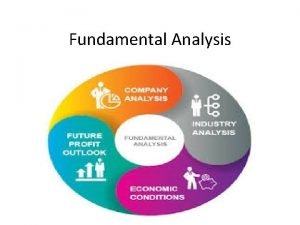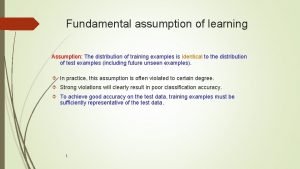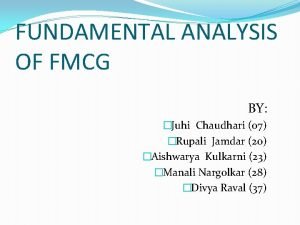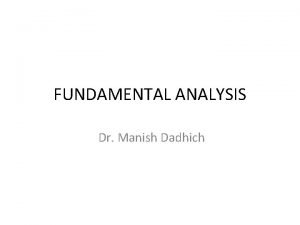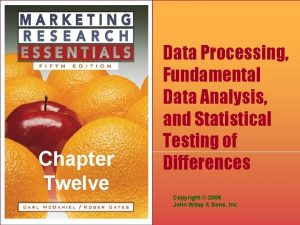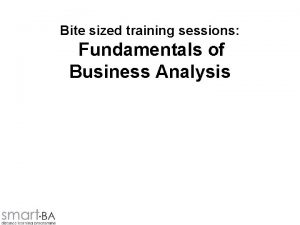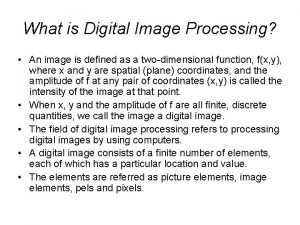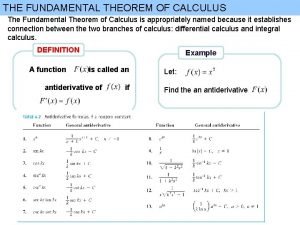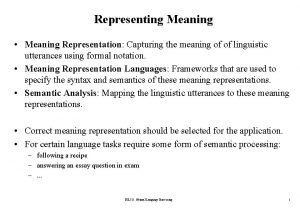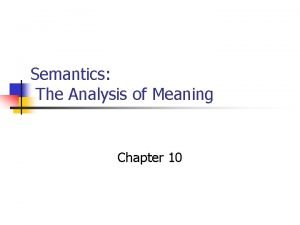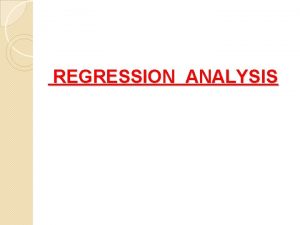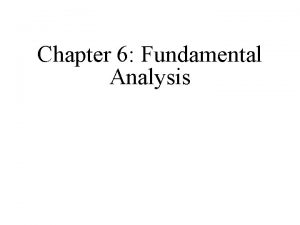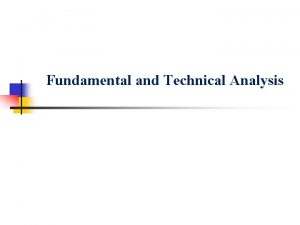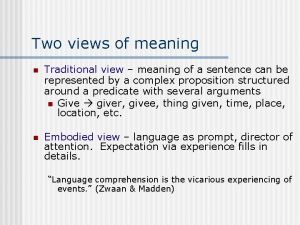Fundamental Analysis Meaning of Fundamental Analysis It is


















- Slides: 18

Fundamental Analysis

Meaning of Fundamental Analysis It is a combination of economic, industry and company analyses to obtain a stock’s current fair value and predict its future value. Also called top-down approach or EIC(Economic, Industry and Company) analysis.

Economy Stock value Industry Company

Economic Analysis is a study of the general economic factors that go into an evaluation of a security’s value. When economic activity is low , stock prices are low, and when the economic activity is high, stock prices are high.

Macroeconomic factors Ø Gross Domestic Product It represents the aggregate monetary value of the goods and services produced in the economy during the specified period. GDP = Consumption + Investment + Exports – Imports High GDP – High return Low GDP – Low return & decline in economy.

Ø Savings and Investment Growth in savings leads to more investments. High capital Investment leads to more production, more demand supply, better prices in the future, higher business profit and a positive outlook for the stock market.

Ø Inflation is a situation where too much money is chasing too few goods. It leads to increase in the price of goods and services. It results in: High raw material cost Non-availability of cheap credit Low earnings

Ø Interest rates The base rate of banks affects the cost of borrowed funds. The base rate is the minimum rate of interest at which banks lend to anyone. It is influenced by RBI’s bank rate, repo rate and CRR.

Ø Budget provides a detailed account of government revenues and expenditures. Deficit Budget – Increase in inflation, affect cost of production Surplus Budget – Deflation Balanced Budget – Highly favorable to stock market

Ø Fiscal Deficit = Government’s Total receipts(excluding borrowing) - Total expenditure.

Ø Tax Structure The business community eagerly awaits the statement from the government regarding the tax policy. Concessions and incentives given to a particular industry encourage investment in that particular industry.

Ø Balance of Payments(BOP) It is the record of a country’s money receipts from abroad and payments to foreign countries. BOP = Receipts – Payments Favourable BOP has a positive effect on the stock market.

Ø Foreign Direct Investment(FDI) FDI in India is a major monetary source for economic development in India. Foreign companies invest directly in fast growing private Indian businesses to take benefit of cheaper wages and changing business environment of India.

Ø Investment by Foreign Institutional Investors(FIIs) A foreign institutional investor (FII) is an investor or investment fund registered in a country outside of the one in which it is investing. Institutional investors most notably include hedge funds, insurance companies, pension funds and mutual funds.

Ø International Economic conditions Worldwide economies are not independent but interdependent. The boom or depression in one company affects other countries and the stock market.

Ø Business Cycle and Investor Psychology

Ø Monsoon and Agriculture In spite of technological advancements, Indian agriculture still depends heavily on the monsoon. Good monsoon are a boon for agriculture. Agriculture is directly or indirectly linked to many industries.

Favourable Monsoon Unfavourable or failure of Monsoon High demand for hybrid seeds, fertilizers, farm equipment, etc Low demand for hybrid seeds, fertilizers, farm equipment, etc. Bumper crops Failure of harvest High rural disposable income Less rural disposable income High rural demand for consumer goods, cars, etc Less rural demand for consumer goods, cars, etc Raw naterials
 Fundamental analysis
Fundamental analysis Fundamental standing position
Fundamental standing position Fundamental tools meaning
Fundamental tools meaning Fundamental assumption meaning
Fundamental assumption meaning Fundamental analysis of fmcg sector
Fundamental analysis of fmcg sector Eic approach of fundamental analysis
Eic approach of fundamental analysis Fundamental data analysis
Fundamental data analysis Fundamental of business analysis
Fundamental of business analysis Grammatical meaning in semantics
Grammatical meaning in semantics Difference between literal and implied meaning
Difference between literal and implied meaning Literal language definition
Literal language definition Conceptual meaning and associative meaning examples
Conceptual meaning and associative meaning examples Isopreference curve
Isopreference curve Unit viscosity
Unit viscosity Pengertian total quality management
Pengertian total quality management 40h6 tolerance
40h6 tolerance Fundamental theorem of algebra
Fundamental theorem of algebra Second fundamental theorem of calculus
Second fundamental theorem of calculus Fundamental theorem of calculus
Fundamental theorem of calculus
